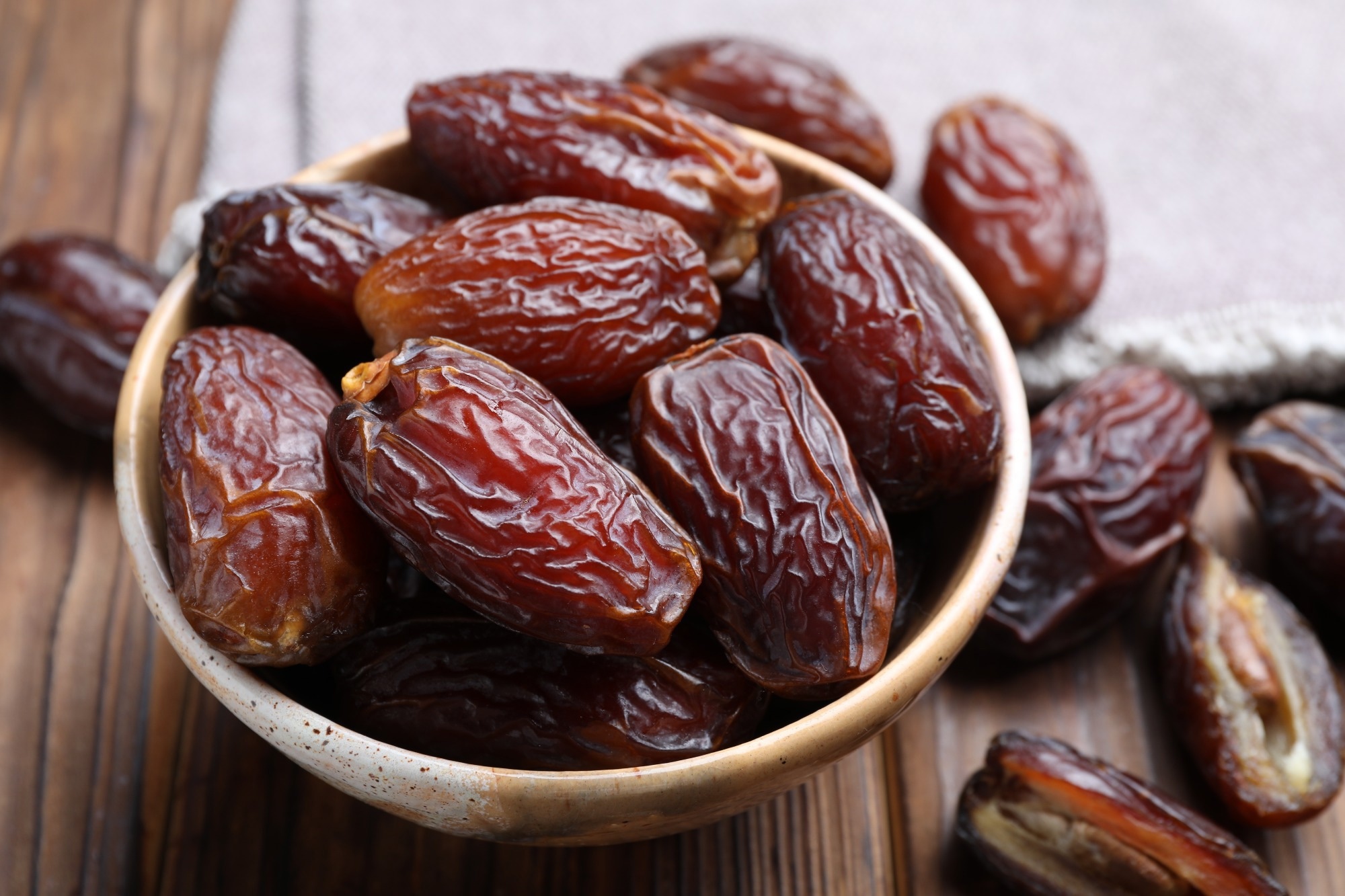Discover how a simple daily dose of red date vinegar helped adults with diabetes cut blood sugar and cholesterol in ten weeks, suggesting effects on key disease pathways.
Study: Clinical and computational exploration of red date fruit vinegar: synergistic effects on cardiovascular and type 2 diabetes pathways. Image credit: New Africa/Shutterstock.com
A randomized controlled trial involving adults with type 2 diabetes and dyslipidemia reported that daily intake of date fruit vinegar for ten weeks significantly improves blood glucose and lipid biomarkers (HbA1c, fasting blood sugar, LDL, total cholesterol, and HDL). These biomarker improvements suggest potential for reducing cardiovascular and metabolic risks. The trial findings are published in Frontiers in Nutrition.
Background
Cardiovascular disease is a leading cause of mortality worldwide, with almost 18 million deaths reported in 2017. This death toll is projected to exceed 23 million by 2030. Type 2 diabetes, characterized by high blood glucose level, is one of the significant risk factors of cardiovascular disease.
It has been hypothesized that both cardiovascular disease and type 2 diabetes share common genetic and environmental risk factors, including obesity, insulin resistance, dyslipidemia, inflammation, and thrombophilia.
Plant-based foods containing high amounts of bioactive compounds have shown promise in managing cardiovascular disease and diabetes. Dates are one such nutritious fruit that contains various bioactive compounds, including polyphenols, flavonoids, vitamins, and dietary fiber.
Fermentation of dates into vinegar is an effective strategy to increase the bioavailability of these bioactive compounds. This makes date vinegar a more effective alternative for managing diseases like cancer, heart disease, diabetes, and gastrointestinal disorders.
In this randomized controlled trial, researchers investigated the effects of date vinegar on blood glucose and lipid profiles in adults with type 2 diabetes and dyslipidemia. They also explored molecular mechanisms of its bioactive compounds in managing cardiovascular disease and diabetes.
Trial design
A total of 50 adults aged 30 to 60 were enrolled in the trial. The participants were randomly assigned to the intervention and control groups. The intervention group participants consumed 20 milliliters of date vinegar daily for 10 weeks. The control group participants consumed a placebo drink containing honey, water, and lemon juice matched for acidity but without bioactive compounds for the same duration.
Computational docking and molecular dynamics simulations assessed the therapeutic mechanisms of date vinegar. These simulations determined the interactions of vinegar-derived bioactive compounds with key proteins related to cardiovascular disease and type 2 diabetes.
Important observations
The trial findings on glycemic control revealed that date vinegar intake causes a significant reduction in fasting blood glucose (from 168.4 to 147.6 mg/dL) and glycated hemoglobin (HbA1c, from 6.85% to 6.08%), both p < 0.05. These findings highlight the beneficial effects of consuming date vinegar in controlling hyperglycemia in the short term, though the study notes that clinical endpoints like complication rates were not assessed. In the control group, these parameters increased over the 10 weeks.
Regarding lipid profile, the trial reported that date vinegar intake is associated with a significant reduction in total cholesterol (225.1 to 213.1 mg/dL) and low-density lipoprotein (LDL) levels (121.1 to 111.1 mg/dL) in the blood. These findings indicate that date vinegar is effective in improving lipid markers linked to cardiovascular risk. In the control group, these parameters showed minimal reduction.
High-density lipoprotein, which plays a vital role in promoting cardiovascular health, showed a significant increase (from 43.2 to 46.5 mg/dL) in the vinegar group compared to that in the control group. This increase may also contribute to the health benefits observed in participants consuming date vinegar. However, triglycerides and very low-density lipoproteins (VLDL) levels showed no significant differences between the vinegar and control groups, suggesting that not all lipid parameters were affected.
The molecular docking analysis identified several important bioactive compounds in date vinegar, including pectin, yamogenin acetate, diosgenin, zeaxanthin, and antheraxanthin. These compounds showed strong binding potential to key target proteins, including angiotensin-converting enzyme (ACE), β1 adrenergic receptor (β1AR), angiotensin II receptor (AR), dipeptidyl peptidase-IV (DPP-IV), and sodium-glucose cotransporter 1 (SGLT1).
The trial also assessed the sugar dynamics of date vinegar using different pressure vacuum drying temperatures. The findings revealed that moderate drying temperatures (65 and 70 °C) retained more sugar (53.7 to 55.1%) but better-preserved bioactive compounds, whereas 75 °C significantly reduced sugar (34.4%, close to fresh dates’ 33.6%) but degraded bioactive compounds.
Significance
The trial findings highlight the therapeutic potential of date vinegar in managing glucose and lipid metabolism and improving cardiovascular health in adults with type 2 diabetes and dyslipidemia.
Based on the findings, researchers proposed hypothesized mechanistic pathways associated with the health benefits of date vinegar. The bioactive compounds present in the vinegar was predicted to interact with key target proteins, including ACE, DPP-IV, and AR, which may contribute to reducing hyperglycemia, hyperlipidemia, and cytokine-mediated inflammation.
These interactions are proposed to promote nitric oxide production, prevent lipotoxicity and cell death, reduce oxidative stress, and improve mitochondrial function, mitigating endothelial dysfunction, atherosclerosis, and cardiovascular risk.
Diabetic patients often avoid consuming fresh dates because they contain a high amount of natural sugar. Fermentation-mediated conversion of dates into vinegar offers a promising alternative that helps reduce sugar content and preserve bioactive compounds.
Overall, the trial, by integrating computational predictions with experimental findings, highlights the potential of date vinegar as a dual-target therapeutic agent in managing cardiovascular disease and type 2 diabetes, but emphasizes that larger and longer clinical studies are needed to confirm long-term benefits and risk reduction.
Download your PDF copy now!
